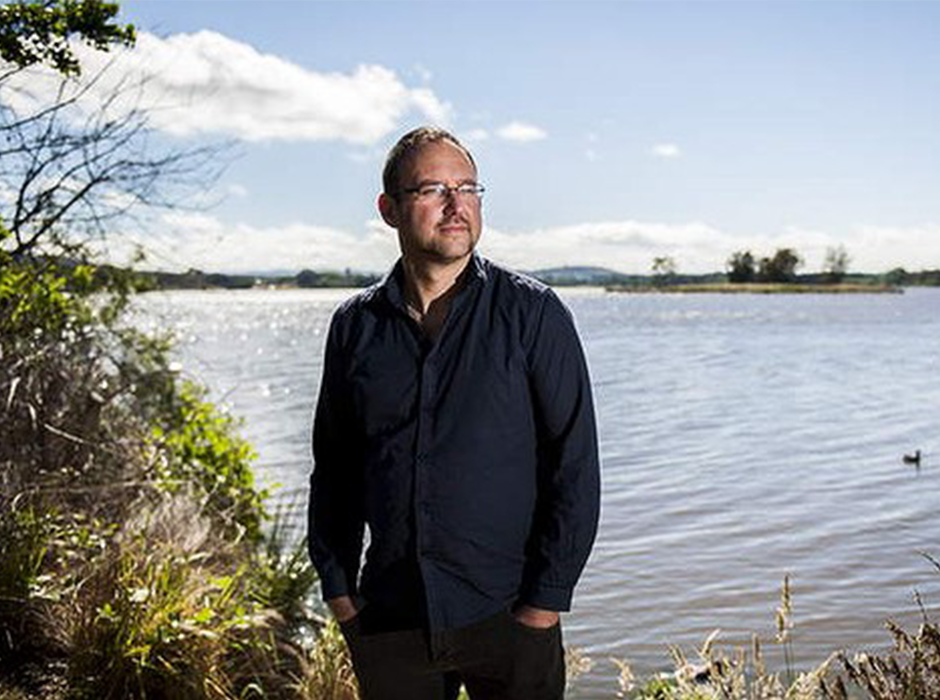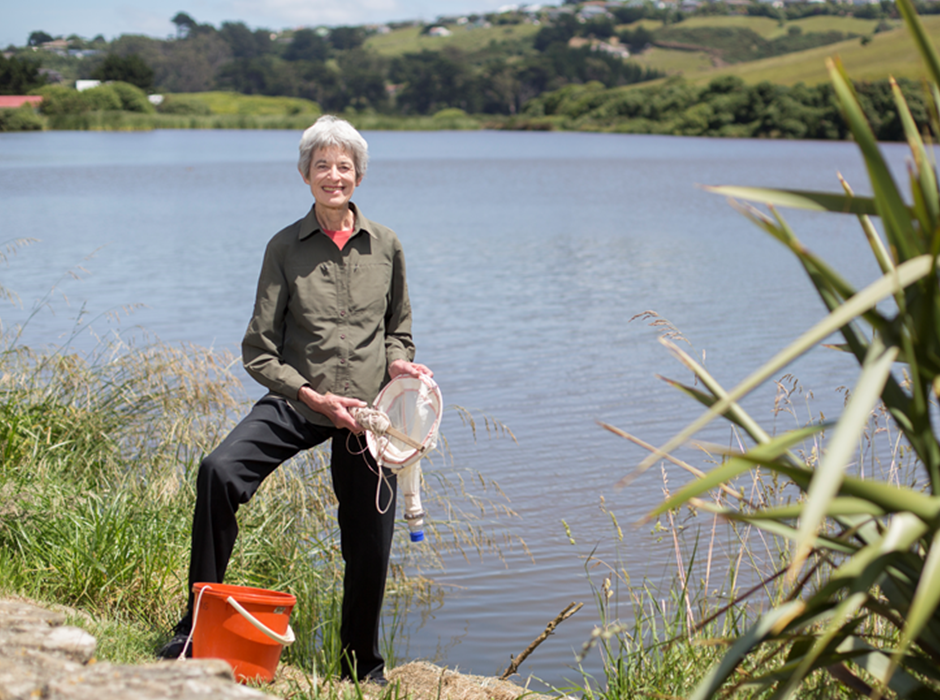@Otago Issue 40

Professor Ross Thompson has been named as the inaugural Dame Carolyn Burns Chair in Freshwater Sciences. He will take up the role in January 2025.
The University of Otago is delighted to announce the appointment of Professor Ross Thompson as the inaugural Dame Carolyn Burns Chair in Freshwater Sciences.
An Otago alumnus, Professor Thompson takes up the role in January 2025. He leaves an established career as Director of the Centre for Applied Water Science at the University of Canberra, where he has worked on diverse freshwater issues including river restoration, climate change, impacts of pollutants, effects of forestry and farming, native fish biology and platypus.
He has also been active in working with indigenous groups to integrate cultural knowledge and practise into river management.
The new Freshwater Chair has been established with the support of a substantial gift from Emerita Professor Dame Carolyn Burns CBE, with the University continuing to raise funds to grow the endowment.
“I am thrilled to be given this opportunity and want to thank Dame Carolyn Burns and the University of Otago for making it happen,” Professor Thompson says.
“Legacy is a rare and precious thing, and I look forward to building on Dame Carolyn’s research legacy, and the broader freshwater research legacy at Otago to make a real difference to New Zealand’s freshwater environments.”
Dame Carolyn is a leading international authority on the ecology of lakes and has a long association with the University of Otago, beginning in 1969 when she started work as a lecturer in the Department of Zoology. She was Head of the Department from 1998-2005.

Emerita Professor Dame Carolyn Burns CBE says the idea behind establishing the new Chair is to provide and develop both research and leadership in the area of Freshwater Sciences, and by doing so help to maintain, enhance, and protect freshwater ecosystems into the future.
Dame Carolyn says the idea behind establishing the new Chair is to provide and develop both research and leadership in the area of freshwater sciences, and by doing so help to maintain, enhance, and protect freshwater ecosystems into the future.
“I am delighted by the appointment of Professor Ross Thompson to this Chair,” Dame Carolyn says.
“His appointment to the position will strengthen Otago University’s research, teaching and training in freshwater sciences and management at a time when the amounts and quality of our freshwater resources are under increasing pressures in New Zealand and worldwide.
“Ross is an excellent scientist and teacher whose commitment to Otago as a former undergraduate and postgraduate student at our university, and his commitment to involving indigenous people, their knowledge and beliefs in the protection and management of our freshwater resources, further strengthens the value of his appointment.”
As inaugural Chair, Professor Thompson says there will be a lot for him to learn in his first year and his initial focus will be on “talking to people in industry, community, government and the research sector to understand the current state-of-play”.
“There is amazing research going on in freshwaters in Aotearoa, and if I can contribute to that or work to better coordinate some of our efforts, that would be fantastic. This role really gives me the freedom to contribute to real improvement in the condition of freshwaters in NZ, particularly in the South Island.”
He is also looking forward to reconnecting with friends and colleagues from the past.
“I completed my Zoology degree and then my PhD at Otago in the late 1990s,” he says. “It is an exciting time to rejoin Ōtākou Whakaihu Waka when it is going through a period of renewal. I am looking forward to building new collaborations with iwi, farming and forestry and community groups, and reactivating some old connections too.”
Over the years, he has kept in touch with his Otago PhD supervisor Professor Colin Townsend and colleagues Professors Gerry Closs and Christoph Matthaei. In 2023, he spent two months at Otago as the inaugural Carolyn Burns Visiting Fellow in Freshwater Sciences, where he undertook new work investigating the effects of climate change on aquatic habitats.
Pro-Vice-Chancellor (Sciences), Professor Richard Barker, says the Division is delighted to welcome Professor Thompson to this exciting and timely new role.
“Professor Thompson’s expertise and international reputation in his field will build on the legacy of Dame Carolyn and the groundbreaking work undertaken in the Department of Zoology,” he says.
“Combined with his extensive experience as a senior leader and his personal connections with Otago, he brings outstanding qualities to the role. I am very much looking forward to working with Professor Thompson, who will be working to build on Otago’s reputation in freshwater research and to provide national leadership in the conservation of our precious water resources.”
The need for coordinated action
Professor Thompson was brought up in Ashburton, on the banks of the Hakatere River.
“As a kid, one of the things we did was go down to the river in summer and play around in the big shady pools. However, water quality issues in the river have meant that for Ashburton kids of today, that is not always a summer option.
“Intensification of farming and forestry, urban sprawl and a changing climate are all realities of the world we live in. My research is about how can we accommodate the demands of society but also do our best to ensure that our freshwater environments are protected and restored.”
He has spent the last 20 years working in universities in Australia, focussing on the Murray Darling Basin.
“The Murray River is under intense pressure as a result of land-use change, demands for irrigation and climate change,” he says.
“But through partnerships between government, the rural sector and scientists, we are starting to turn things around.
“I worry that playing the blame game for water quality issues distracts us from the need for coordinated action across sectors.”
A previous president of the Australian Freshwater Sciences Society and a fixture for the last decade in major projects on Australia’s rivers, Professor Thompson is grateful for the opportunities Australia has given him.
“I will be sad to leave some amazing colleagues in government and the research sector,” he says.
“After a decade or so we had come to an accommodation – they don’t mention the cricket, and I don’t mention the rugby.”
He has previously acted as Deputy-Vice-Chancellor Research and Enterprise, and Dean of Science at the University of Canberra and has sat on the Australian Research Council College of Experts and the New Zealand Marsden Panel.









